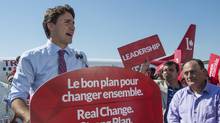A dubious poll purporting to show Justin Trudeau trailing in his own Montreal riding has set off alarm bells in an industry already struggling to regain credibility after some spectacular failures to gauge election outcomes.
The poll of voters in Papineau, conducted by CROP and commissioned by the NDP, suggested the Liberal leader was running 11 points behind New Democrat Anne Lagace Dowson.
It was strategically leaked to some media outlets Thursday a few hours before Trudeau was to face off against NDP Leader Tom Mulcair and Conservative Leader Stephen Harper in a crucial debate on the economy – an event with the potential to determine the outcome of the Oct. 19 federal election.
The immediate objective was clear: to rattle the Liberal leader and put him off his game.
But it also had a longer range goal: to break the three-way logjam in voting intentions by persuading Canadians not to waste their votes on a party whose leader can’t even win his own seat.
The Liberals immediately charged that the poll had over-sampled NDP supporters and under-sampled Liberal supporters. And five reputable pollsters who examined the methodology at the request of The Canadian Press agreed that the survey did indeed seem flawed in a number of ways, skewing the results.
Another survey, conducted by Mainstreet Research for Postmedia and involving a sample more than twice the size of the CROP poll, was released the next day with markedly different results, suggesting Trudeau was running five points ahead of Lagace Dowson.
As part of its survey, CROP asked respondents how they voted in the 2011 election: 32 per cent said NDP, just 14 per cent said Liberal – a far cry from the vote share each party actually scored last time, 28 and 38 per cent respectively.
Some deviation can be expected; people forget or lie about how they voted. But such a big discrepancy should have raised “huge questions” about how representative the survey sample truly was, said Christian Bourque, executive vice-president of Leger Marketing.
But even had CROP’s methodology been beyond doubt, Bourque is disturbed by the idea of a pollster’s research being used “a bit like guerilla polling” by a political party to destroy an opponent’s prospects.
“To me it does look like or sound like survey bombing, much like photo bombing,” Bourque said in an interview. “And as an industry leader, I don’t find it’s a direction that we want to go in collectively as an industry ... I find that a source of worry and concern.”
The Papineau poll flap is a cautionary tale for so-called progressive voters who are being urged by various groups to vote strategically for the opposition party best positioned to defeat Harper’s Conservatives. National poll numbers tell voters nothing about the dynamic in individual ridings and riding polls aimed at helping them make a more educated decision can be badly flawed or misleading.
Guidelines established by the industry’s voluntary professional watchdog, the Marketing Research and Intelligence Association, caution polling firms against marketing a product under the guise of market research, Bourque noted. Conducting a poll for a party to advance its own political interests treads too close to the line for Bourque’s comfort and “does not do our industry any good.”
CROP vice-president Youri Rivest did not respond to a request for comment.
Mainstreet is not doing any partisan polling during this election but has done some polling in the past for municipal campaign candidates. Mainstreet president Quito Maggi said his firm would never allow a client to leak survey results to score political points.
“In fact, my contract with Postmedia, they can’t publish a poll if I say they can’t publish a poll. It doesn’t matter how newsworthy it might be, if I don’t feel it’s responsible, they can’t publish it,” Maggi said.
Among other things, Maggi said he wouldn’t allow publication of a riding poll that surveyed fewer than 600 respondents or that had a margin of error greater than four percentage points, 19 times in 20. The CROP poll surveyed 375 Papineau voters and had a margin of error of over five points.
Maggi suggested that CROP may not have known the NDP would leak its poll. However, the NDP leaked another CROP riding survey a couple weeks earlier, which suggested Bloc Quebecois Leader Gilles Duceppe was running a whopping 37 points behind the NDP incumbent in his old Montreal riding of Laurier-Sainte-Marie.
The controversy comes just as the polling industry is attempting to salvage its reputation with the creation of the new Canadian Association for Public Opinion Research, aimed at enhancing the quality of polling. It’s founding chairman, Ipsos Public Affairs head Darrell Bricker, has in the past railed against shoddy polls peddled to credulous news outlets and reported to the voting public as gospel.
“All of this MUST stop,” Bricker and Ipsos partner John Wright wrote in a 2011 open letter that bears re-reading today.
“We are distorting our democracy, confusing voters, and destroying what should be a source of truth in election campaigns – the unbiased, truly scientific public opinion poll.”
Questionable NDP poll adds to industry's credibility issues






























Laissez un commentaire Votre adresse courriel ne sera pas publiée.
Veuillez vous connecter afin de laisser un commentaire.
Aucun commentaire trouvé